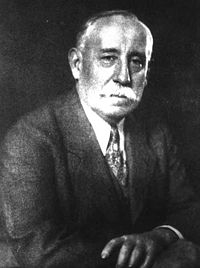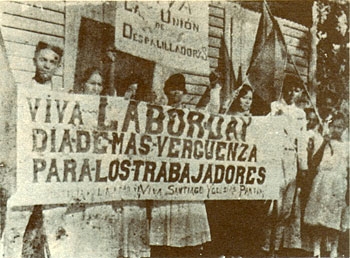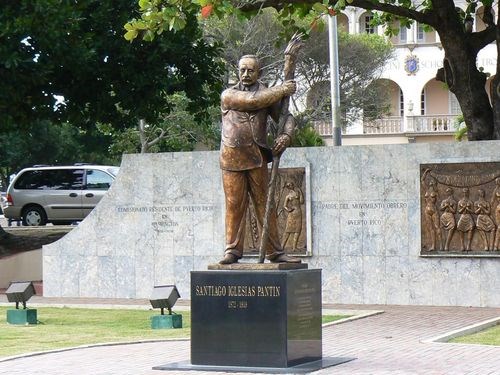 |
| Santiago Iglesias Pantin |
Labor rights have been vital to social and economic development since the Industrial Revolution in 18th and 19th centuries. The labor law developed during this time and the body of laws gave restrictions on working people and the organizations they work for. In these laws we are given certain legal rights and our claimed human rights between us and our employer. Now in the 21st century, these rights are hardly considered because we know they exist. For Puerto Ricans, these laws were much harder to gain. I’m going to take you back to a time where not everybody had these rights.
Santiago Iglesias Pantin was born on February 22, 1872 in La Coruña, Spain. He was involved in many union movements, but the first one started when he was just a teenager in Spain. At the age of twelve, he convinced all of his fellow workers to quit work and go to the Sunday morning socialist mass meeting. He was apprenticed to be a cabinet maker, but at age 15 in 1887 he hopped aboard a ship headed to Havana, Cuba. Once in Cuba he participated in union forming activities and served as secretary to the Workingmen Trades Circle from 1889 to 1896. This was his first taste of unionization. But in 1896, he was forced to flee Cuba because he was wanted by the authorities for his involvement in the Cuban revolutionary movement. In the process of fleeing he boarded a ship intended to go to England, but instead got off in Puerto Rico to work towards their labor rights movement.
 |
| Tobacco strippers celebrating Labor Day. |
Iglesias spoke out about his views through the written word which was especially heroic because governments during this time did not tolerate the labor movement. Within the first year of being in Puerto Rico he established a newspaper advocating the unionization of the working class in Puerto Rico, entitled Ensayo Obrero. He was again jailed for these efforts and spent seven months in prison until the request of his release by the United States government after their occupation of the Island. Without delay, he resumed his labor organization activities. This time around though, the military interceded, but let him continue his efforts in organization. On October 23, 1898, he helped found the Regional Federation of Workers. He also founded Porvenir Social at this time, another newspaper that he kept publishing until 1900.
Also in 1900, he traveled to the United States and established a relationship with the president of the American Federation of Labor. Samuel Gompers appointed him to be the general organizer of the AFL for Cuba and Puerto Rico. He continued organizing unions throughout the Island and established another newspaper called the Unión Obrera. He also was one of the founders of the AFL affiliated, the Free Federation of Puerto Rico Workers.
 |
| Park commemorating Iglesias in San Juan |
He published another newspaper in 1914, La Justicia Social, which he kept running until 1925. In 1915 he organized the socialist party, which campaigned for statehood. Under his leadership the party grew rapidly, and he was elected to the Insular Senate and then reelected, serving until 1932. He also participated in the international labor movement by serving as secretary to the Pan American Federation of Labor from 1925 to 1933.
Iglesias was elected to a four year term as Resident Commissioner to the U.S. House of Representatives on November 8, 1932 and was reelected four years later. While he was in congress he served on many committees including the Committee on Insular Affairs, the Agriculture and Labor Committee and the Committee on Territories. He introduced many bills to improve the political, economic, industrial, and agricultural life of Puerto Rico, and gave them the right to elect their own governor. He tried to enable the people of Puerto Rico to form a constitution and state government, but the proposals did not pass, and there is still debate about whether or not Puerto Rico should be a state. Under his position of Resident Commissioner, he was successful in including Puerto Rico in numerous federal benefits and laws. He died in office in Washington, D.C. on December 5, 1939.
Iglesias was a very influential leader, and the people of Puerto Rico owe him a lot of gratitude. For the people of Puerto Rico, he got all kinds of laws passed that improved their economic and political lives. Not only was this influential leader just a great hero, he also happens to be my great grandfather. He died before I was even born, but he is a great man to look up to. He fought for what he believed in, no matter how hard it was to make progress. Even though he was jailed many times for his efforts, he never gave up and that is a really important quality to me that heroes have. He fought for what was right, and no matter what anybody said, he never changed his views against workers rights.
Page created on 12/11/2010 5:28:47 PM
Last edited 12/11/2010 5:28:47 PM
Resident Commissioner Santiago Iglesias and His Times by Gonazlo F. Cordova
Santiago Iglesias: Labor Crusader by Clarence Senior
Santiago Iglesias Pantin- Un Politico Circunstancial Gallego En Puerto Rico By Manuel Mourelle De Lema
